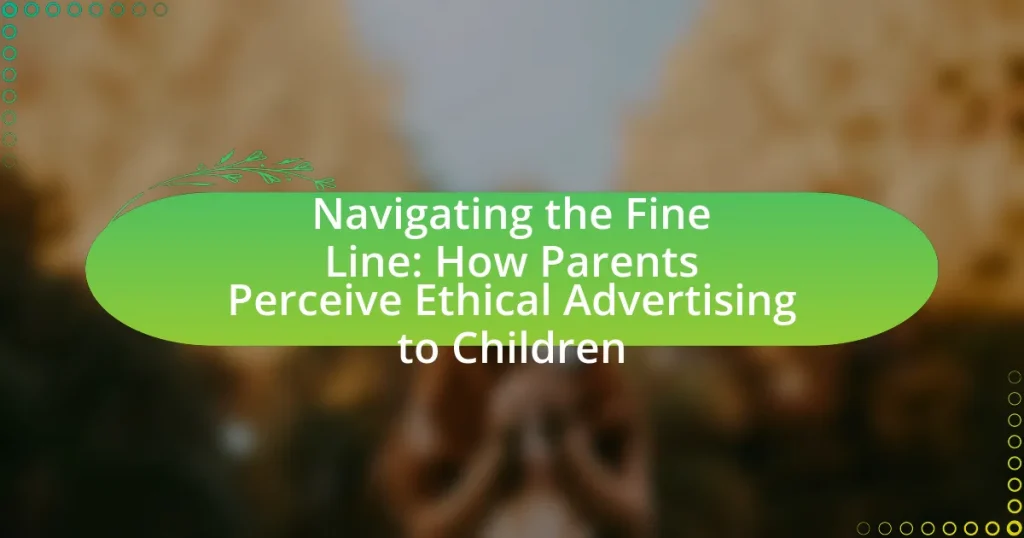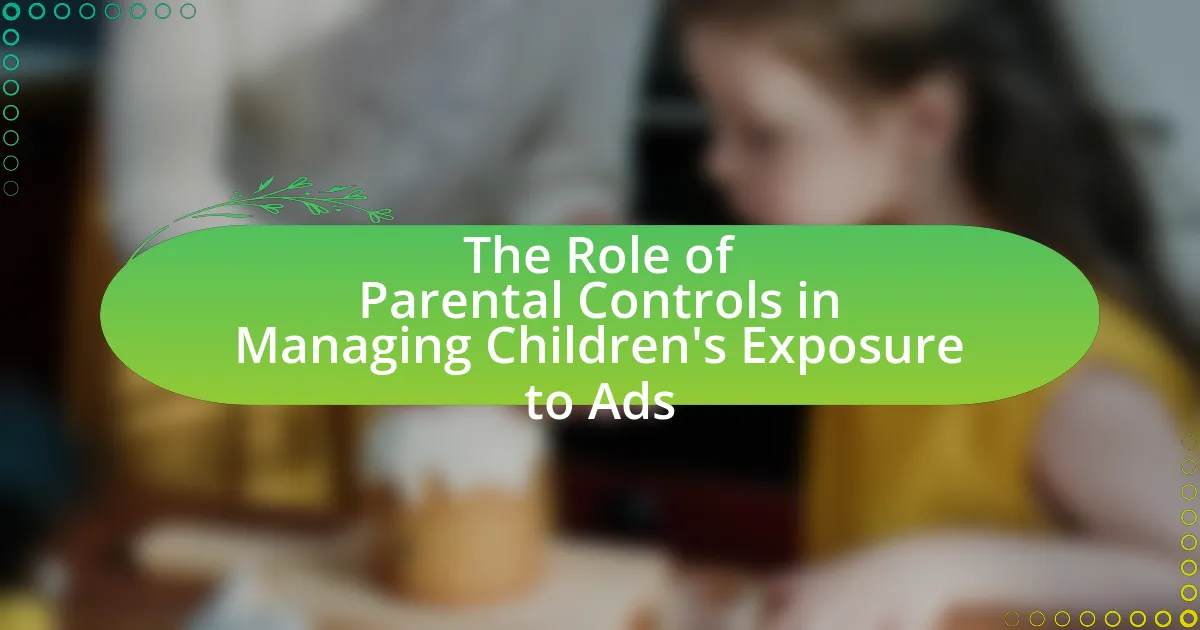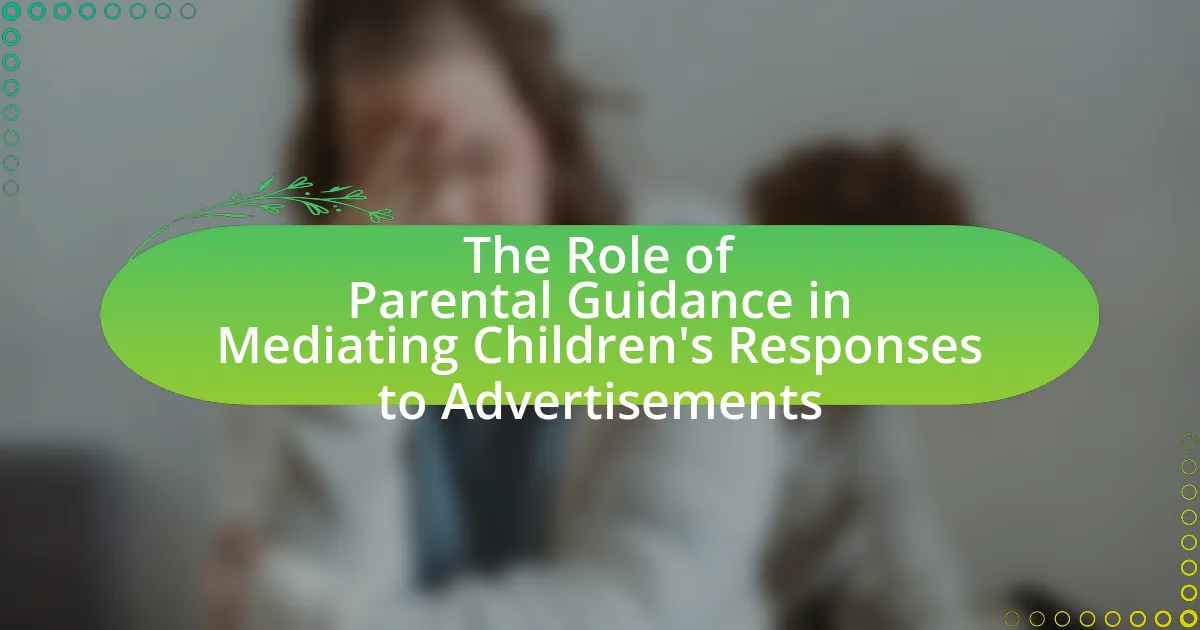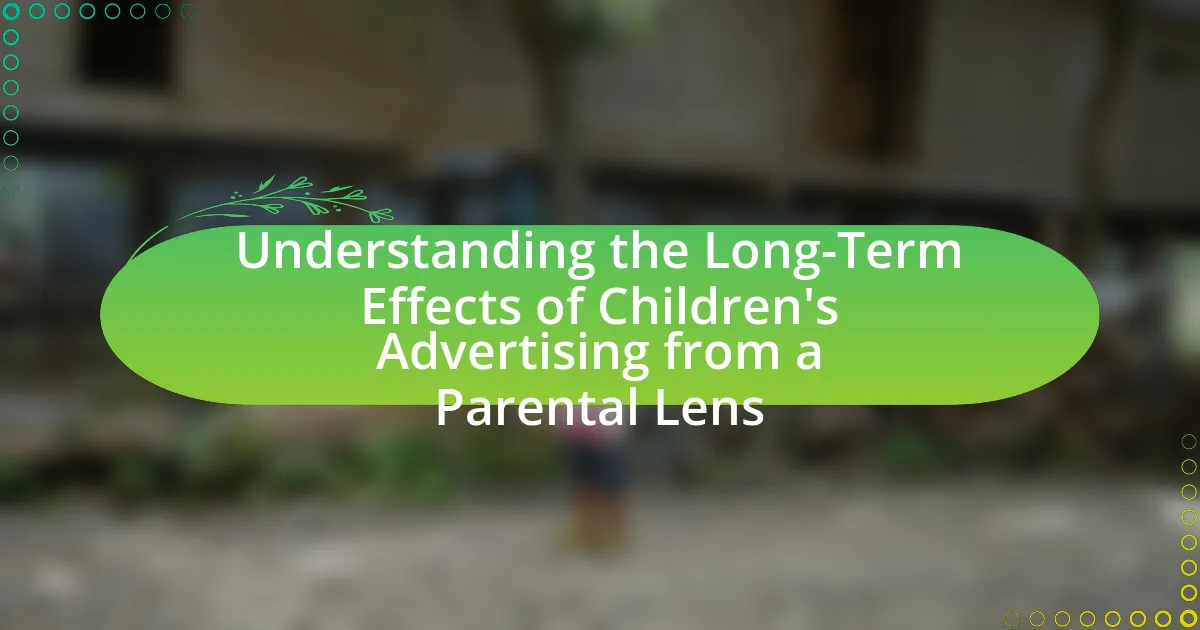The article focuses on ethical advertising to children, emphasizing the importance of marketing practices that prioritize honesty, transparency, and the well-being of young audiences. It explores how parents define ethical advertising, the principles guiding their perceptions, and the influence of cultural differences on their views. Additionally, the article discusses the significance of ethical advertising in protecting children’s developmental needs, the potential impacts of advertising on their behavior, and the challenges parents face in navigating conflicting messages. It also highlights the role of media literacy and personal experiences in shaping parents’ perceptions, as well as the implications of these perceptions on advertising practices and brand loyalty.
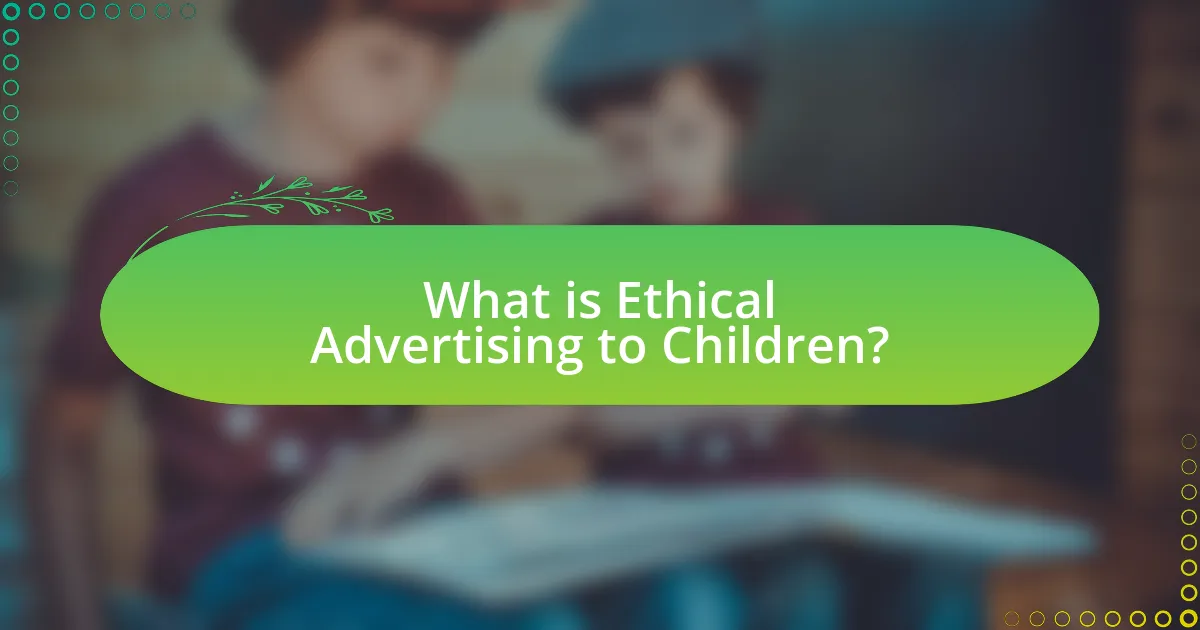
What is Ethical Advertising to Children?
Ethical advertising to children refers to marketing practices that prioritize the well-being and development of young audiences while ensuring transparency and honesty. This form of advertising avoids manipulative tactics, respects children’s cognitive abilities, and promotes positive values, such as health and education. Research indicates that ethical advertising can lead to better consumer behavior and brand loyalty among children, as it fosters trust and aligns with parental expectations for responsible marketing.
How do parents define ethical advertising for children?
Parents define ethical advertising for children as marketing practices that prioritize honesty, transparency, and the well-being of young audiences. They believe that ethical advertising should avoid manipulation, misleading claims, and exploitation of children’s vulnerabilities. Research indicates that parents expect advertisements to promote positive values, such as respect, kindness, and healthy lifestyles, while also providing clear information about products. A study by the American Psychological Association highlights that parents are concerned about the impact of advertising on children’s self-esteem and behavior, reinforcing their demand for responsible marketing practices.
What principles guide parents’ perceptions of ethical advertising?
Parents’ perceptions of ethical advertising are primarily guided by principles of honesty, transparency, and respect for children’s developmental stages. Honesty involves the expectation that advertisements should not mislead or exaggerate product benefits, ensuring that parents feel confident in the information presented. Transparency relates to the clear disclosure of advertising intent, allowing parents to understand when content is promotional rather than educational. Respect for children’s developmental stages emphasizes the need for age-appropriate messaging that considers children’s cognitive and emotional maturity, preventing exploitation of their vulnerabilities. These principles are supported by research indicating that parents are more likely to view advertising as ethical when it aligns with these values, fostering trust in brands that adhere to them.
How do cultural differences influence parents’ views on ethical advertising?
Cultural differences significantly influence parents’ views on ethical advertising by shaping their values, beliefs, and expectations regarding marketing practices aimed at children. For instance, parents from collectivist cultures may prioritize community welfare and social harmony, leading them to support advertising that promotes shared values and responsible consumption. In contrast, parents from individualistic cultures might emphasize personal choice and freedom, resulting in a more lenient view of advertising that encourages self-expression and individualism. Research indicates that these cultural frameworks affect how parents interpret the ethical implications of advertising, with studies showing that parents in different cultural contexts assess the appropriateness of marketing messages based on their cultural norms and parenting philosophies.
Why is ethical advertising important in the context of children?
Ethical advertising is crucial in the context of children because it protects their developmental needs and promotes responsible consumption. Children are impressionable and may not fully understand persuasive techniques, making them vulnerable to misleading claims. Research indicates that children under the age of eight cannot distinguish between advertising and programming, which underscores the necessity for ethical standards to prevent exploitation. Furthermore, ethical advertising fosters positive values, encouraging healthy behaviors and critical thinking, which are essential for their growth and well-being.
What are the potential impacts of advertising on children’s behavior?
Advertising significantly influences children’s behavior by shaping their preferences, consumption habits, and social interactions. Research indicates that children exposed to advertising are more likely to request advertised products, leading to increased parental spending. A study published in the journal “Pediatrics” found that children aged 2 to 11 who viewed food advertisements were more likely to choose unhealthy snacks over healthier options, demonstrating a direct impact on dietary choices. Furthermore, advertising can affect children’s social behaviors, as they may emulate behaviors seen in commercials, such as materialism or peer pressure to conform to advertised lifestyles. This influence underscores the importance of ethical considerations in advertising targeted at children.
How does ethical advertising contribute to children’s development?
Ethical advertising contributes to children’s development by promoting positive values and healthy behaviors. This type of advertising often emphasizes honesty, respect, and social responsibility, which can help shape children’s understanding of these concepts. Research indicates that children exposed to ethical advertising are more likely to develop critical thinking skills regarding media messages, as they learn to discern between manipulative and constructive content. For instance, a study published in the Journal of Advertising Research found that children who engage with ethical advertisements demonstrate improved social skills and empathy, as these ads often highlight community involvement and altruism.
What challenges do parents face regarding ethical advertising?
Parents face significant challenges regarding ethical advertising, primarily due to the pervasive nature of marketing targeted at children. This marketing often employs manipulative tactics that can exploit children’s developmental vulnerabilities, making it difficult for parents to shield their children from misleading messages. Research indicates that children under the age of eight are particularly susceptible to advertising, as they may not fully understand the persuasive intent behind ads (American Psychological Association, 2013). Additionally, parents struggle with the inconsistency of regulations surrounding advertising practices, which can vary widely by region and medium, complicating their ability to make informed decisions about what is appropriate for their children.
How do parents navigate conflicting messages in advertising?
Parents navigate conflicting messages in advertising by critically evaluating the content and context of the advertisements their children encounter. They often engage in discussions with their children to clarify misconceptions and provide guidance on distinguishing between marketing tactics and reality. Research indicates that parents utilize strategies such as co-viewing advertisements, which allows them to address conflicting messages in real-time, and reinforcing their family values to counteract misleading advertising claims. For instance, a study published in the Journal of Consumer Research highlights that parental mediation significantly influences children’s understanding of advertising, helping them to develop critical thinking skills regarding media consumption.
What role does media literacy play in parents’ perceptions?
Media literacy significantly influences parents’ perceptions by equipping them with the skills to critically analyze and evaluate media content. This enhanced understanding allows parents to discern the ethical implications of advertising directed at children, leading to more informed decisions regarding their children’s media consumption. Research indicates that parents with higher media literacy are more likely to recognize manipulative advertising techniques and advocate for responsible marketing practices, thereby fostering a healthier media environment for their children.

How do Parents Perceive Ethical Advertising?
Parents generally perceive ethical advertising as a crucial factor in protecting their children from misleading or harmful messages. They believe that ethical advertising should prioritize honesty, transparency, and respect for children’s developmental stages. Research indicates that 70% of parents express concern over advertisements that exploit children’s naivety, highlighting the need for ethical standards in marketing directed at young audiences. Furthermore, parents often advocate for regulations that ensure advertisements are age-appropriate and do not promote unhealthy behaviors or unrealistic expectations. This perception underscores the importance of responsible advertising practices that align with parental values and the well-being of children.
What factors influence parents’ perceptions of ethical advertising?
Parents’ perceptions of ethical advertising are influenced by factors such as personal values, cultural background, and the perceived impact of advertising on children. Personal values, including beliefs about honesty and integrity, shape how parents evaluate the ethicality of advertisements. Cultural background plays a significant role, as different cultures have varying norms regarding advertising practices and child protection. Additionally, parents consider the potential effects of advertising on children’s behavior and well-being, leading them to scrutinize the messages conveyed in advertisements. Research indicates that parents are more likely to view advertising as ethical when it aligns with their values and when they believe it promotes positive outcomes for children.
How do personal experiences shape parents’ views on advertising ethics?
Personal experiences significantly shape parents’ views on advertising ethics by influencing their perceptions of what is appropriate for children. For instance, parents who have encountered misleading advertisements may develop a heightened skepticism towards marketing tactics, leading them to advocate for stricter ethical standards in advertising aimed at children. Research indicates that parents’ past interactions with advertising, such as negative experiences or awareness of manipulative strategies, can result in a protective stance regarding their children’s exposure to ads. This protective attitude is often reinforced by their desire to shield their children from potential exploitation, as evidenced by studies showing that parents prioritize transparency and honesty in advertising content.
What role does education play in shaping perceptions of ethical advertising?
Education plays a crucial role in shaping perceptions of ethical advertising by equipping individuals with critical thinking skills and ethical frameworks. Through formal education, individuals learn to analyze advertising messages, recognize persuasive techniques, and understand the implications of advertising on societal values. Research indicates that higher levels of education correlate with increased skepticism towards misleading advertisements, as educated consumers are more likely to question the motives behind marketing strategies. For instance, a study published in the Journal of Advertising Research found that individuals with advanced education demonstrated a greater ability to identify ethical concerns in advertising, leading to more informed consumer choices.
How do parents assess the credibility of advertising aimed at children?
Parents assess the credibility of advertising aimed at children by evaluating the source, content, and intent of the advertisements. They often consider whether the advertisement comes from a reputable brand, the clarity and honesty of the message, and whether it aligns with their values and the well-being of their children. Research indicates that parents are increasingly aware of the persuasive techniques used in advertising, such as emotional appeals and celebrity endorsements, which can influence children’s perceptions. A study published in the Journal of Advertising Research found that 70% of parents express concern about the impact of advertising on their children’s choices, highlighting their critical approach to assessing credibility.
What criteria do parents use to evaluate advertising messages?
Parents evaluate advertising messages based on criteria such as credibility, relevance, and ethical considerations. Credibility involves assessing the trustworthiness of the source and the accuracy of the claims made in the advertisement. Relevance pertains to how well the message aligns with the values and needs of the family, particularly regarding the interests of their children. Ethical considerations include the potential impact of the advertisement on children’s behavior and well-being, as parents are increasingly concerned about the influence of marketing on their children’s choices. Research indicates that parents prioritize these factors to ensure that advertising is not misleading and promotes positive values, reflecting a growing awareness of the ethical implications of advertising directed at children.
How do parents differentiate between ethical and unethical advertising practices?
Parents differentiate between ethical and unethical advertising practices by evaluating the honesty, transparency, and intent behind the advertisements. Ethical advertising is characterized by truthful claims, respect for the audience’s intelligence, and the promotion of positive values, while unethical advertising often employs misleading information, manipulative tactics, or targets vulnerable populations, such as children. Research indicates that parents are particularly concerned about advertisements that exploit children’s naivety or promote unhealthy products, leading them to scrutinize the content and context of ads more closely. For instance, a study published in the Journal of Advertising Research found that 70% of parents believe that advertisements should not mislead children about the benefits of a product, highlighting their commitment to protecting their children from deceptive marketing practices.
What are the Implications of Parents’ Perceptions on Advertising Practices?
Parents’ perceptions significantly influence advertising practices aimed at children. When parents view advertising as manipulative or unethical, they are more likely to advocate for stricter regulations and transparency in marketing strategies. Research indicates that 70% of parents express concern over the impact of advertising on their children’s health and well-being, leading to increased demand for responsible advertising that prioritizes children’s interests. Consequently, advertisers may adapt their strategies to align with parental expectations, focusing on ethical messaging and educational content to maintain trust and market access.
How do parents’ perceptions influence advertising strategies?
Parents’ perceptions significantly influence advertising strategies by shaping the messaging and content aimed at children. Advertisers often conduct market research to understand parents’ attitudes towards various products and their concerns about ethical advertising practices. For instance, a study by the American Psychological Association found that parents are increasingly concerned about the impact of advertising on their children’s health and well-being, prompting brands to adopt more transparent and responsible marketing approaches. Consequently, advertising strategies are tailored to align with parents’ values, emphasizing safety, educational benefits, and ethical considerations to gain parental approval and trust.
What changes have advertisers made in response to parental concerns?
Advertisers have implemented stricter guidelines and transparency measures in response to parental concerns regarding the ethical implications of advertising to children. These changes include the adoption of age-appropriate content, limiting the use of persuasive techniques that exploit children’s vulnerabilities, and increasing disclosures about advertising practices. For instance, many companies now adhere to the Children’s Advertising Review Unit (CARU) guidelines, which emphasize responsible marketing practices aimed at protecting children from misleading or harmful advertisements. Additionally, some brands have shifted towards promoting educational and positive messaging in their campaigns, reflecting a growing awareness of parental expectations for ethical advertising.
How do ethical advertising practices affect brand loyalty among parents?
Ethical advertising practices significantly enhance brand loyalty among parents. When brands engage in ethical advertising, they demonstrate transparency, honesty, and social responsibility, which resonate with parents’ values and concerns for their children’s well-being. Research indicates that 73% of parents are more likely to support brands that prioritize ethical practices, such as promoting healthy products and avoiding manipulative tactics. This alignment with parental values fosters trust and emotional connections, leading to increased brand loyalty.
What can parents do to promote ethical advertising for children?
Parents can promote ethical advertising for children by actively engaging in discussions about media literacy and advertising practices. By educating their children on how advertisements are designed to influence behavior and emotions, parents can help them critically analyze the messages they encounter. Research indicates that children who receive media literacy education are better equipped to understand advertising tactics and make informed choices (Levine, 2018, “Media Literacy and Advertising: A Study of Children’s Understanding”). Additionally, parents can advocate for regulations that protect children from misleading advertisements, such as supporting policies that limit advertising during children’s programming. This proactive approach not only fosters a critical mindset in children but also contributes to a broader cultural shift towards responsible advertising practices.
How can parents advocate for better advertising standards?
Parents can advocate for better advertising standards by actively engaging with policymakers and participating in public forums. By voicing concerns about the impact of advertising on children, parents can influence regulations that promote ethical advertising practices. Research indicates that children are particularly vulnerable to misleading advertisements, which can lead to unhealthy behaviors and unrealistic expectations. For instance, a study published in the Journal of Advertising Research found that children exposed to unhealthy food advertisements are more likely to choose those products over healthier options. By collaborating with organizations focused on child welfare and supporting initiatives that call for stricter advertising guidelines, parents can effectively contribute to the establishment of higher advertising standards that protect children.
What resources are available for parents to educate themselves about ethical advertising?
Parents can access various resources to educate themselves about ethical advertising, including online courses, books, and reputable websites. Online platforms like Coursera and edX offer courses on advertising ethics, while books such as “Advertising Ethics: A Critical Perspective” by Kim Sheehan provide in-depth analysis. Additionally, organizations like the American Advertising Federation and the Better Business Bureau offer guidelines and articles on ethical advertising practices. These resources help parents understand the implications of advertising on children and promote informed discussions about media literacy.
